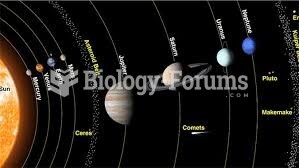|
|
|
Did you know?
Your heart beats over 36 million times a year.
Did you know?
Intradermal injections are somewhat difficult to correctly administer because the skin layers are so thin that it is easy to accidentally punch through to the deeper subcutaneous layer.
Did you know?
Increased intake of vitamin D has been shown to reduce fractures up to 25% in older people.
Did you know?
Approximately 25% of all reported medication errors result from some kind of name confusion.








